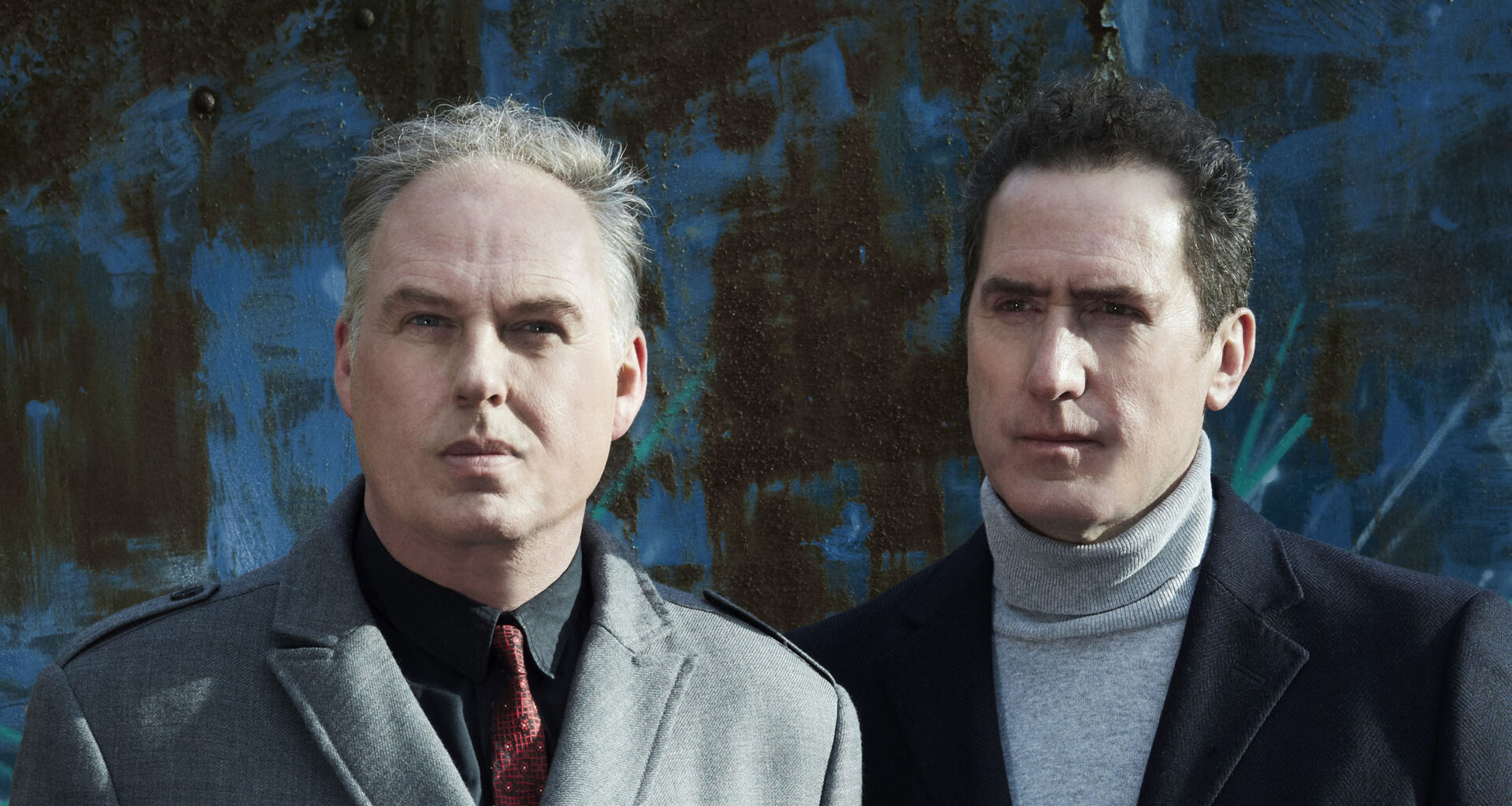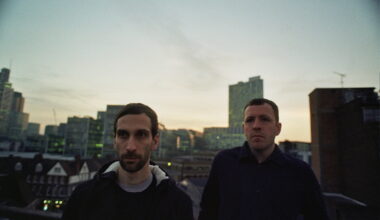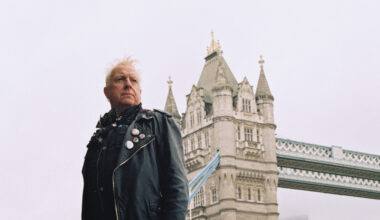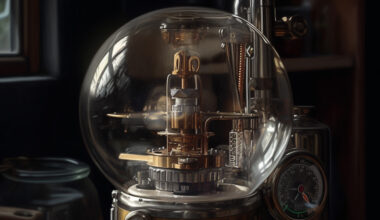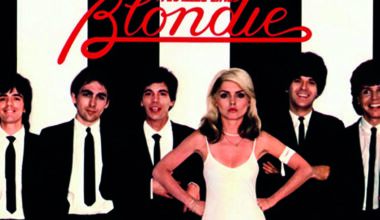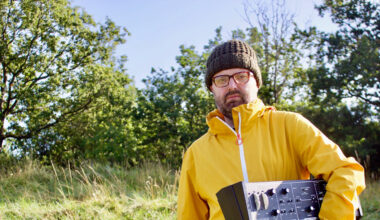With the release of the new OMD album, ‘English Electric’, Andy McCluskey talks about the Voyager spaceship, Helen of Troy, butchering songs for radio and, inevitably, Kraftwerk
Orchestral Manoeuvres In The Dark are a curious beast. To the casual listener, they are OMD, the popmeisters who conquered Hollywood with ‘If You Leave’ from the John Hughes blockbuster ‘Pretty In Pink’ and had hits such as ‘Locomotion’, ‘(Forever) Live And Die’ and ‘Sailing On The Seven Seas’. But because of these ubiquitous crowd pleasers, what is often forgotten about Orchestral Manoeuvres (as opposed to OMD) is their period as electronic innovators.
Here, they married Teutonic experimentation and motorik rhythms with a distinctly English interpretation of Elektronische Volksmusik. They wrote songs about planes and oil refineries and phone boxes, as well as deceased female historical figures. Early singles like ‘Messages’, ‘Enola Gay’,
‘Souvenir’ and ‘Maid Of Orleans’ won them international recognition, while the 1979 Kraftwerk homage and one-off Factory release ‘Electricity’ is now rightly regarded as a synthpop classic. So with this formative legacy, it’s perhaps not surprising that OMD have produced a brand new opus entitled ‘English Electric’.
Having parted company in 1989, the original creative nucleus of Andy McCluskey and Paul Humphreys reunited in 2007 for a tour of their biggest-selling album, ‘Architecture & Morality’. Three years later, they released a comeback album called ‘History Of Modern’. It was generally well received, but admirers of OMD’s past knew of their capabilities and were, for the most part, unsatisfied – and this was in the back of McCluskey’s mind when it came to recording ‘English Electric’.
“OMD are a band, unlike most of the other bands in the world, for whom just writing a good song actually isn’t enough,” says McCluskey. “Certainly not for many of our fans, who expect and desire something that is not only a great tune but is also conceptual, interesting, challenging and new for them.”
After the disparate collection of songs on ‘History Of Modern’, ‘English Electric’ is intended as a cohesive listening experience. Indeed, having mostly worked on the recordings separately for its predecessor, the new album is a true creative partnership between McCluskey and Humphreys, with each playing to their strengths and confronting their creative tensions for the better by actually sitting in a room together. Adopting the theme of broken ideals and Utopian dreams ending in dystopic failure or regret, they came up with a mantra: “What does the future sound like?”.
Paul Humphreys’ 2011 audio-visual collaboration with ‘Generation X’ author Douglas Coupland (‘Electric Ikebana’, which they created for French telecom company Alcatel-Lucent) indicated that he and McCluskey had aspirations to craft a more abstract work. For the launch of ‘English Electric’, they have made a bold statement with the voice collage teaser ‘Decimal’, while the first single is the lengthy ‘Metroland’.
“The album version of ‘Metroland’ is seven minutes and 33 seconds… that’s the single!” says McCluskey. “For the radio, we’ve managed to butcher it down to three minutes and 52 seconds, but we’ve still been getting shit off plugging people who’ve been trying to take it to Radio 2.”
The dilemma of radio play and anticipated album sales has lingered, although OMD are prepared to live for their art again. “We think that ‘Night Café’ and ‘Dresden’ stand the best chance of getting A-List plays on Radio 2. But is it going to sell us more records? Is it going to change anything? Are we going to make lots of money out of it? The answer is no. So what we’ve decided to do is continue with this statement of intent. ‘Metroland’ is a beautiful song with a metronomic sequence which is somewhat Kraftwerkian and has a thumping gothic electro bass drum on it.”
Anyone who loves ‘Europe Endless’ shouldn’t have any trouble digesting the new OMD material. But could such artistic declarations be considered self-indulgent at a time when a fair chunk of the band’s fans will be expecting straight pop songs? Andy McCluskey isn’t unduly concerned.
“It’s 30 years since ‘Dazzle Ships’,” he says. “People’s abilities to listen to more fractured music… they’ve been educated over the last 30 years. There has been a long line of musique concrète for well over half a century now, and we still enjoy exploring that because it allows us to create textures, soundscapes and thoughts that you can’t express and play with in any other way.
“‘Decimal’ was largely made of found samples, which were then manipulated and slowed down. On ‘Atomic Ranch’, I wrote the words and then used a speaking programme, where you type in the words and choose the voice. So that’s programmed with three different voices to say those words. I was intending to actually sing the track myself, but I found myself twiddling with these Vox Machina plug-ins. I was thinking, ‘Oh, that’s rather good, I’ll save that’. So I never got round to singing it myself because the robot voices did a good job.”
So what does McCluskey think about the interesting paradox of people often adoring Kling Klang-styled vocoders while disapproving of Autotune?
“People draw lines in sound in weird and arbitrary places, don’t they?” he chuckles. “I have no problem with anything being used… if I get something out of it! I’m a little bit bored of pop vocals with Autotune as an effect, but modern production is so clean and you can hear all the separation between the instruments and the voices so clearly that, unless you are the most incredible singer, actually most people are Autotuned. It’s just a case of how much. Have you just pulled it into tune or is it patently obvious and sliding?”
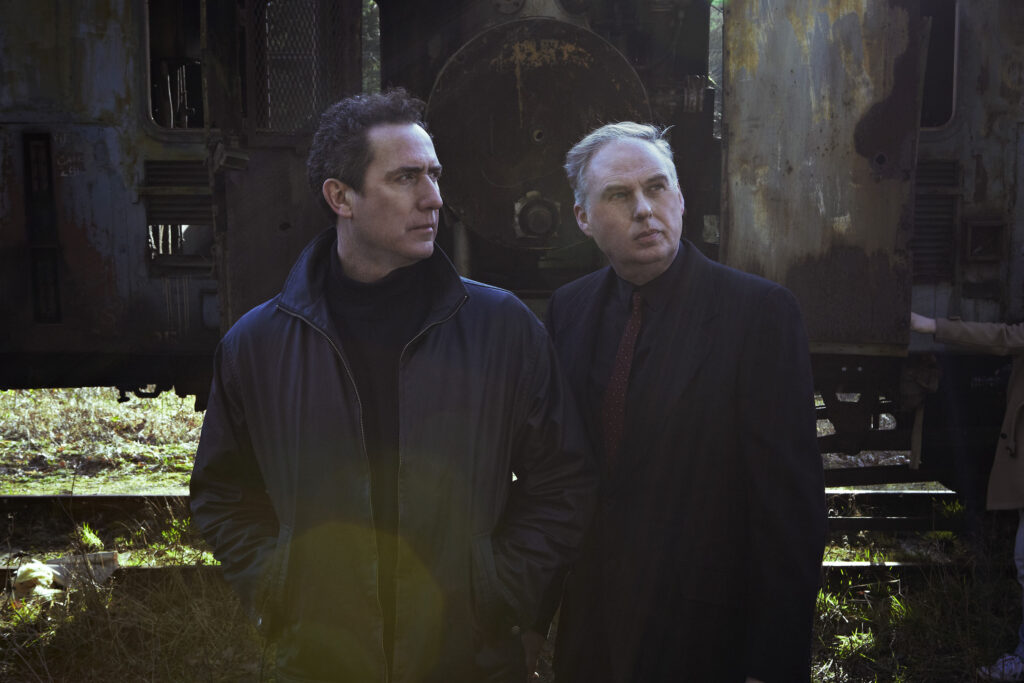
If fans of the group’s earlier albums were disappointed by ‘History Of Modern’, is it the turn of the Hollywood and 90s era OMD audience to be disappointed with ‘English Electric’?
“No, I don’t think so, because the entire album does not sound like ‘Decimal’ or like ‘Atomic Ranch’,” says McCluskey. “What we’ve teased out so far, it’s about us reclaiming that conceptual ground. People who are craving the songs will be more than happy with ‘Helen Of Troy’, ‘Night Café’, ‘Dresden’ and ‘Final Song’, whereas some of the other tracks don’t conform to a traditional songwriting formula. ‘Our System’ starts with the sound of the Voyager spacecraft going through the magnetosphere of Jupiter, comes in with three verses and explodes in a cacophony of drums and choirs at the end, and then wanders away again with the magnetosphere of Jupiter… it doesn’t have a chorus, it doesn’t have a melody.”
The end result is stratospherically breathtaking. But this is what many love about OMD’s idiosyncratic nature. Out of their experimental confines come various accessible pop structures. ‘Night Café’ is a prime example. Paul Humphreys has described it as ‘She’s Leaving’ meets ‘Souvenir’. “It is!” concurs McCluskey. “It’s beautiful and it’s got an absolutely scorching melody. The melody was so good that I threw away all the other instruments and rewrote the track to swing with it.”
There’s also return of a Paul Humphreys lead vocal on the lovely ‘Stay With Me’ and the tornado that is ‘Dresden’. The latter sounds like Neu! produced by Joe Meek and appears to be the latest in the lineage of OMD songs about the mechanics of war and its consequences on the human condition.
“But it’s not about the bombing of Dresden in the same way as ‘Enola Gay’ was about the aeroplane that dropped the atom bomb,” says McCluskey. “‘Dresden’ is a whopping great, unsubtle metaphor. It was interesting that we found ourselves in Dresden – it was quite incredible – but the song had already been written before I went.”
The thinking behind ‘English Electric’ seems to have a conceptual affinity with ‘Dazzle Ships’, the fractured nautical journey that was panned on its release in 1983 but has since been vindicated as a brave sonic exploration of Cold War tensions and economic corruption. McCluskey can see ‘English Electric’ having a spiritual connection.
“That’s an interesting thought, isn’t it? Does it find itself in a similar economic and political landscape? In some respects, yes it does. But as bad as the economy is now, I don’t think most people living in Western democracies feel quite as fearful as they did in the early 80s because there isn’t the same threat of atomic destruction. So the landscape isn’t exactly the same. There are similarities and there may be similarities in the way it was conceived because of the environment, but I would have to admit they are unconscious. We certainly have not tried to recreate ‘Dazzle Ships’.”
‘Dazzle Ships’ was partly inspired by the short wave radio broadcasts of yesteryear and today’s equivalent could be online social networking. Indeed, the internet has played a big part in the construction of ‘English Electric’.
“I discovered the sound of Voyager on YouTube and I downloaded vocal machine programmes and samples from the internet,” says McCluskey. “I used to have ring binder folders to do my homework in because OMD… we are geeks and we research our songs. My laptop became my ring binder, with a load of stuff we downloaded and information we didn’t even get round to using, like The Doomsday Clock. Watch out for that one.”
‘English Electric’ also sees OMD collaborate with both established and rising figures from the European electronic scene. The latter include Fotonovela, a production team best known for working with Athens-based female synth duo Marsheaux. Fotonovela’s George Geranios and Nick Bitzenis were OMD’s label bosses in Greece via their Undo Records and McCluskey told them he wanted to write a song called ‘Helen Of Troy’. “Well, we’re Greek, we’ll write one for you!” he remembers them saying. “They asked me to contribute to an album they were doing as a guest vocalist and they sent me this track,” he adds. But McCluskey liked it so much, his swift reply was “Sorry, this is too good, can I have it on the OMD album?”.
And then there’s ‘Kissing The Machine’, with electronic godfather and ex-Kraftwerk member Karl Bartos. The track first appeared on Elektric Music’s 1993 ‘Esperanto’ album and featured McCluskey on guest lead vocals, but has now been reanimated in a similar way to when ‘Dazzle Ships’ resurrected two 1981 B-sides.
“The original version was wonderful, although not as many people have ever heard it as it merited,” says McCluskey. As for using a 20-year-old song, McCluskey feels “it lyrically fitted with the dystopian vibe of the ‘English Electric’ album”. The words, vocal melody and lead synth melody have been retained from the original, but Paul Humphreys has reworked the track from scratch. “The result probably sounds more like Kraftwerk than the one we did 20 years ago!” McCluskey amusingly admits.
OMD out-Kraftwerking Kraftwerk is quite some achievement. But if that was not enough to whet the appetite of electronic music fans the world over, McCluskey then proudly announces that “not only have you got a song written by Bartos and McCluskey that’s been completely reprogrammed by Paul Humphreys, it just happens to feature Claudia Brücken speaking in a German robot voice!” With what could be perceived as OMD, Kraftwerk and Propaganda all contributing to the same song, the Anglo-German amalgamation is synthesised heaven. It will also probably give the Euro-sceptics out there more to worry about.
There has been talk of ‘English Electric’ being OMD’s last album. The robotic resignation of the penultimate track, ‘Atomic Ranch’, certainly sets the tone before what could be considered OMD’s epitaph, the soulful ‘Final Song’. Andy McCluskey, however, promises it is “not about the end of OMD”. Instead, for him, ‘English Electric’ is a definitive artistic statement.
“The great thing we have enjoyed about ‘English Electric’ is that, apart from ‘Kissing The Machine’, it has all been written in the last three years,” he says. “That gives it a holistic seal. It’s one of its strengths.”
But is there anywhere for OMD to go after this? McCluskey appears perfectly happy with where they are at the moment.
“I think the nice thing is that we’re back doing all sorts of different things and maybe that’s the best place to be. ‘Electricity’ was on the first album, so was ‘Dancing’. ‘Enola Gay’ was on the second album, so was ‘VCL XI’. ‘Night Café’ is on ‘English Electric’ and so is ‘Please Remain Seated’. And long may it continue to be that way.”
OMD First XI
Organisation
(1980)

Includes the perky ‘Enola Gay’, but elsewhere the album veers into wonderfully dark, doomy, almost Joy Division territory.
Dazzle Ships
(1983)

All those oddball interludes and grainy soundscapes make for challenging listening, but it’s way ahead of its time. Ask Radiohead.
Crush
(1985)

The opening track, ‘So In Love’, is OMD’s first US hit single. The album is produced by Stephen Hague, as is the next one.
Sugar Tax
(1991)

With Humphreys on a sabbatical, this is the first of what were effectively three McCluskey solo albums. It’s good stuff too.
Universal
(1996)

‘Universal’ picks up where ‘Liberator’ left off in terms of its sound and feel, but the material has greater depth and weight.
Orchestral Manoeuvres In The Dark
(1980)
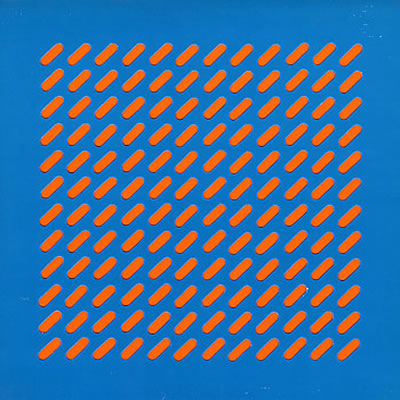
One minute it’s quirky pop, the next it’s loopy experimentation. A promising start. A terrific Peter Saville die-cut sleeve too.
Architecture & Morality
(1981)

OMD’s biggest-selling album, ‘A&M’ features hits like ‘Souvenir’ and ‘Joan Of Arc’. What’s that sound? That’s a Mellotron, that is.
Junk Culture
(1984)

McCluskey and Humphreys find their pop blueprint down the side of the sofa. ‘Locomotion’ puts them back on ‘Top Of The Pops’.
The Pacific Age
(1986)

OMD attempt to capitalise on their new-found fame in America with what is probably their most overtly commercial collection.
Liberator
(1993)

The mainstream 90s dance sound of ‘Liberator’ seems a little forced. It has its moments, but it’s a long way from OMD’s best.
History Of Modern
(2010)

McCluskey and Humphreys record together for the first time since 1986. The hardcore fans loved it. The critics weren’t so sure.
‘English Electric’ is out on 100% Records
